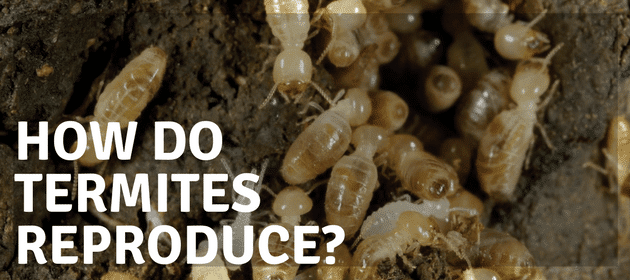If the thought of termites settling into your home terrifies you, just wait until you learn more about how they operate. They are non-stop eating and sleeping machines. They stop only long enough to reproduce or to build new tunnels to reach new sources of food.

Fortunately, something that is integral to their reproductive cycle is also something that helps you identify that you have termites in your house. Of course, getting a Glendale termite inspection and ongoing termite treatment is the best thing you can do to keep your home safe, but a little education can help you spot signs of a problem early.
Before you learn about the reproductive cycle of termites, there’s something important you need to know: Termites develop into one of three caste members. All termites start life as larva when they are hatched from the egg, and then they develop into nymphs.
After a series of molts, termites develop into either a soldier, a worker, or a reproductive member of the caste system. Each has a different physical makeup that allows them to do the job to which they are assigned in the colony. For example, a soldier has a large head with large mandibles for defending the colony. However, this large upper body makes it hard for it to feed itself. Therefore, the worker termites feed the soldiers.
If there is a shortage of a certain class in the colony, termites can actually change their caste status. In other words, a solder can become a worker, a worker can become a reproductive member, and so on.
When members of the reproductive class become mature, they develop wings and functioning eyes so that they can leave the colony and seek out mates. They also develop harder exoskeletons so they can withstand the dryer and harsher conditions outside the colony.
Reproductive termites swarm to mate, and then their wings fall off. They form their own colonies and become the kings and queens of those colonies. The king and queen termites are the only fully mature termites in the whole colony. The queen can actually live up to 10 years if the conditions are right, whereas the workers and soldiers only live about a year or two.
The fact that reproductive termites shed their wings after mating is a great boon to homeowners. Those wings are often the only signs that homeowners notice when there is a termite problem. The wings will typically be found along window sills or near other openings of the house, such as on the ground near the windows or the doors.
[lyte id=”cHdUNr1Kp1s” /]
The spent wings look a bit like the scales of a fish. They are brown or brownish-yellow in color. If you see what you think are termite wings in your house, call an exterminator near Glendale immediately to perform a termite inspection. The earlier you catch an infestation, the more likely the termite treatment will be to work.
Shed wings from the reproductive cycle are not the only sign of termites present in your home. Plus, by the time the reproductive class has reached maturity to perform the swarming and mating, the rest of the colony has been chewing its way through your home and causing significant damage.
Other signs of termite infestation can include termite waste (might look like soil or dirt), dirt tubes near the foundation of your house or in the ground around the house, cracks on the walls, peeling paint, or weak spots on the floor.
But you don’t have to wait until you see signs of a problem to call an exterminator. A regular Glendale termite inspection should be a part of your routine home maintenance. An inspection from a qualified professional can discover termites deep in the recesses of your home where you would never find them yourself.
Varsity Termite and Pest Control can develop a termite pest control plan that will keep your Arizona home free of these destructive pests. Our plan includes routine inspections and treatments to get rid of any termites that are already in your home and to keep out new termites. We have a range of effective termite treatment near Glendale options, including non-toxic options. Our exterminators will also help you make changes around your home that can prevent re-infestation. Call us in Arizona today to schedule your termite inspection and to get the termite treatment you need.
Published By:
Varsity Termite and Pest Control – Tony Kaufman
West Valley Location:
Office: 602-560-6021
East Valley Location:
Office: 602-757-8252


© Varsity Termite and Pest Control - Google - Privacy Policy